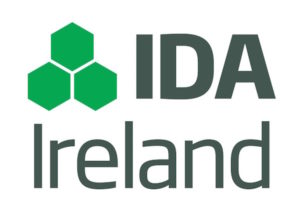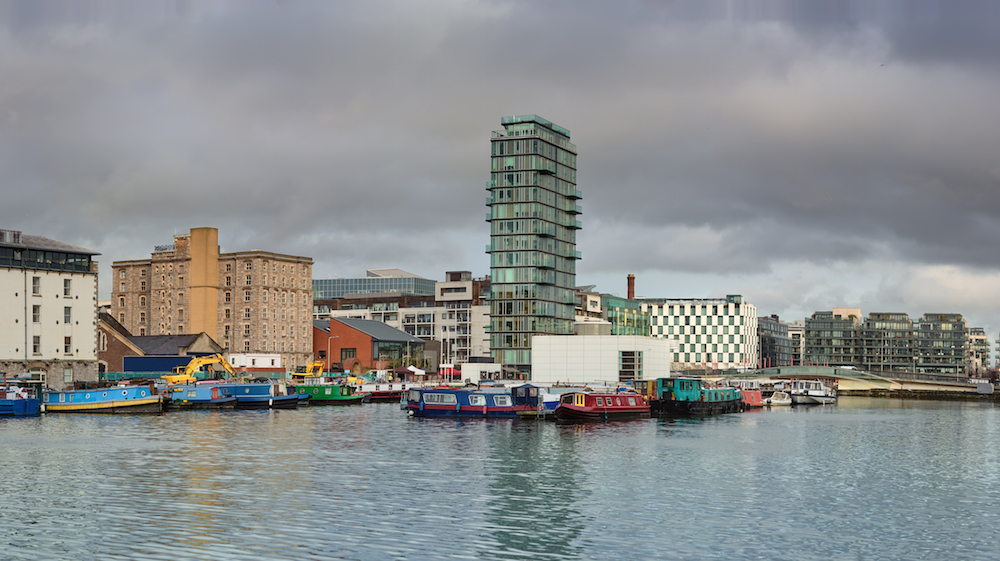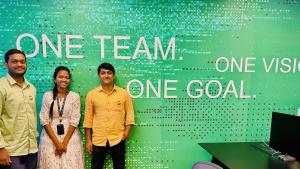It may be a relatively small island, but Ireland has always been an enormous center of human creativity. The Emerald Isle is well known for its skilled musicians and its famous writers, but today a newer form of creativity is making the country a key player in the 21st century global economy. Dublin, Ireland’s charming capital of just over half a million residents, has become one of the most important hubs of technology innovation in Europe.
 To find out more about the history of Dublin’s tech scene and why so many global multinational companies are setting up shop in the land of Guinness and James Joyce, I spoke with Ken Finnegan, chief technology officer for IDA Ireland, an Irish government agency whose mission is to attract and develop foreign direct investment in the country. As Ken describes it, his job is to meet with other visiting CTOs and introduce them to all Ireland has to offer their companies, including a rich ecosystem of research and development for emerging technologies such as IoT, cybersecurity, AI, and more.
To find out more about the history of Dublin’s tech scene and why so many global multinational companies are setting up shop in the land of Guinness and James Joyce, I spoke with Ken Finnegan, chief technology officer for IDA Ireland, an Irish government agency whose mission is to attract and develop foreign direct investment in the country. As Ken describes it, his job is to meet with other visiting CTOs and introduce them to all Ireland has to offer their companies, including a rich ecosystem of research and development for emerging technologies such as IoT, cybersecurity, AI, and more.
Early days in Ireland
The growth of the tech sector in Ireland isn’t exactly new. IBM, one of the first multinational tech companies to set up a presence in Ireland, showed up way back in 1956, followed by Ericsson in 1957, and then HP, Microsoft, Oracle, and other big names in the 1970s and 1980s. Back then, Ireland chiefly offered these companies access to a workforce with general manufacturing skills, not the highly skilled technology professionals that comprise the modern Irish workforce.
In fact, says Ken, while Ireland is attractive to big companies for a variety of reasons, “Availability of talent is the currency of the moment.” Following Brexit, Ireland is set to emerge as the only English-speaking country in the Eurozone. This access to the European market gives Ireland access to European talent as well. Says Ken, “We may be a small country of 4.5 million, but we have access to half a billion people across Europe.”
Today, the biggest names in tech—Google, Apple, Facebook, Airbnb, and many more—can be found in the Silicon Docks area of Dublin, a bustling, fast-growing area of the city that is the Irish equivalent to Silicon Valley.

Don’t Miss: New Relic Celebrates Three Years in Dublin—And the Best Is Yet to Come
Ken notes that by 2009 or 2010, Ireland reached a kind of “critical mass” and suddenly it wasn’t just technology companies coming to Dublin, it was also big-name retailers setting up e-commerce operations in the country. Companies like Ralph Lauren, says Ken, “definitely didn’t come here for our fashion sense, they came here for our technological capabilities.”
Vibrant tech startup scene
In addition to being home to nearly all the biggest multinational technology companies, Dublin is also the center of a thriving tech startup scene. Many of these innovative companies, says Ken, are being founded by people who worked for years in some of the bigger tech firms developing their capabilities, but who then decided to forge out on their own and launch a startup. All of this startup activity has attracted venture capitalists; VC investment in Ireland has risen from €274 million (approx. $294M) in 2011 to nearly €1 billion (approx. $1.07B) in 2016.

There’s a strong sense of camaraderie and collaboration within the Dublin tech community. One of the services IDA offers visiting companies is to set up an “itinerary” and connect them with everyone they need to meet in the local scene—sometimes even their competitors. According to Ken, the local tech business leaders are smart enough to know that while there might be a little bit of collateral damage (e.g., employees jumping ship), collaborating with other local startups in their space helps to build critical mass, which only attracts more talent.
One way the community helps to build a buzz is with high-profile events that appeal to developers. Hackathons happen every weekend, says Ken, and growing companies often use them to recruit top talent. He cites the example of American augmented reality (AR) company Daqri, which hosted a hackathon in Dublin that attracted some of the best AR developers away from other big European cities. “I call it the Hollywood effect,” Ken claims. “When you’re able to attract the best in a certain area, others will follow.”
A city transformed
This influx of energy, talent, and investment is rapidly transforming the city. While Dublin has always been a vibrant place, today it is truly bustling and there’s an enthusiastic vibe in the air. From the glass towers of Silicon Docks to the crowded pubs and winding streets of Temple Bar, Dublin is becoming a world-class, multicultural European capital, and there are hubs of growth and development blossoming in other Irish cities as well, including Cork, Limerick, and Galway. Ireland offers something for everyone: exciting urban centers surrounded by rich natural beauty. There’s even great surfing off the island’s west coast (“although you need to be made of steel,” Ken warns).
Surprises, and what’s ahead
When asked what would surprise Silicon Valley veterans about Ireland, Ken recounts the story of a group of U.S. executives taken on a tour of a Dublin-based materials science research institute. At the end of the tour, the American CEO turned to his CTO with a look of amazement and asked, “How have we not heard of Ireland before?” There is so much research and innovation going on in Ireland that when visitors from Silicon Valley see it firsthand, they immediately recognize its importance.
So what big changes does Ken predict for the technology industry in Ireland in the next 5 to 10 years? “Artificial intelligence is the number one topic that comes up in conversations with companies at the moment. I think it’s the biggest disruptor that’s going to hit us—the new Industrial Revolution.” With some of world’s leading AI academics as well as advanced research centers to be found in Ireland, Ken says that when it comes to the brave new world of artificial intelligence, “Ireland is well positioned to lead.”
The views expressed on this blog are those of the author and do not necessarily reflect the views of New Relic. Any solutions offered by the author are environment-specific and not part of the commercial solutions or support offered by New Relic. Please join us exclusively at the Explorers Hub (discuss.newrelic.com) for questions and support related to this blog post. This blog may contain links to content on third-party sites. By providing such links, New Relic does not adopt, guarantee, approve or endorse the information, views or products available on such sites.


